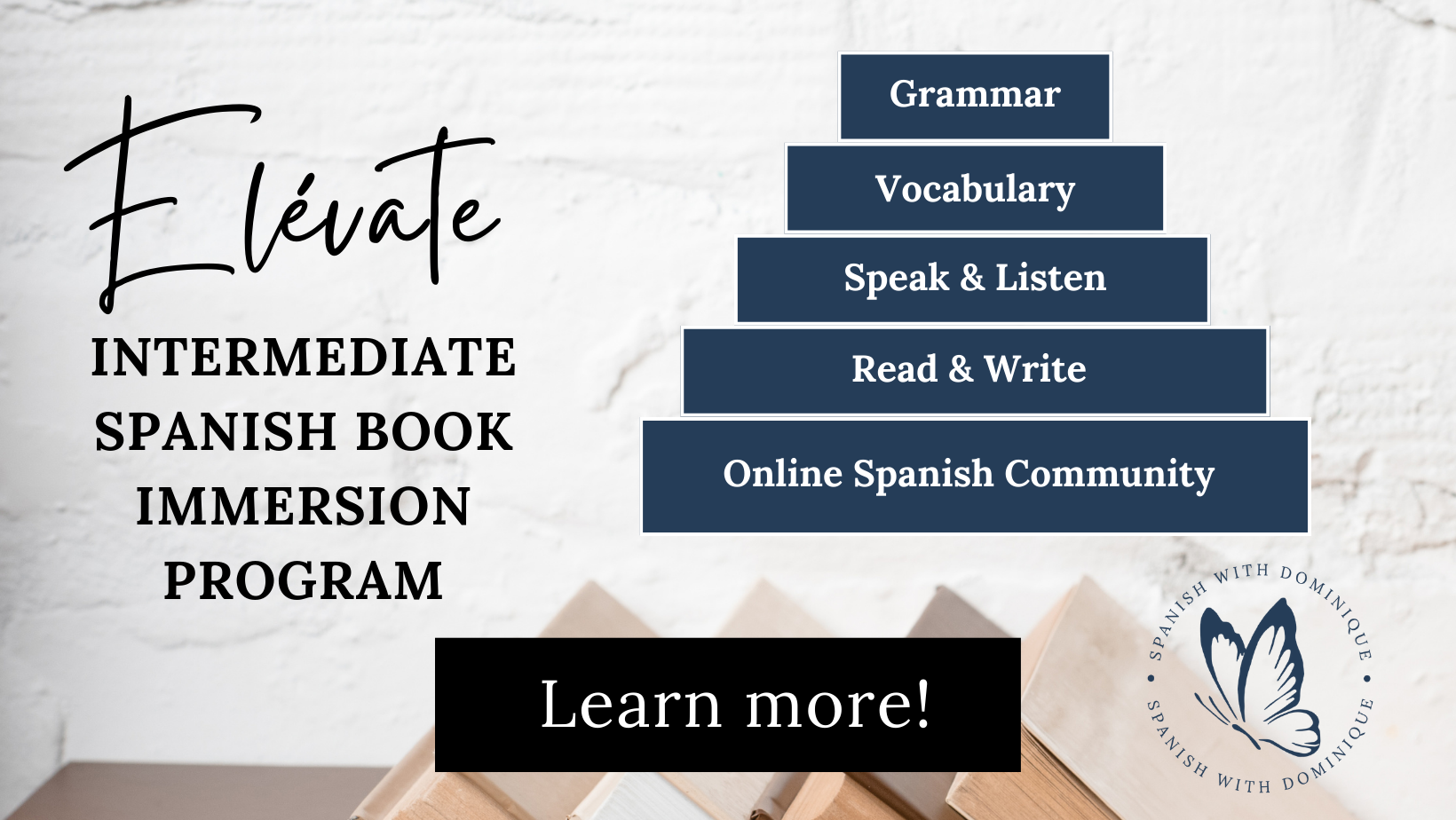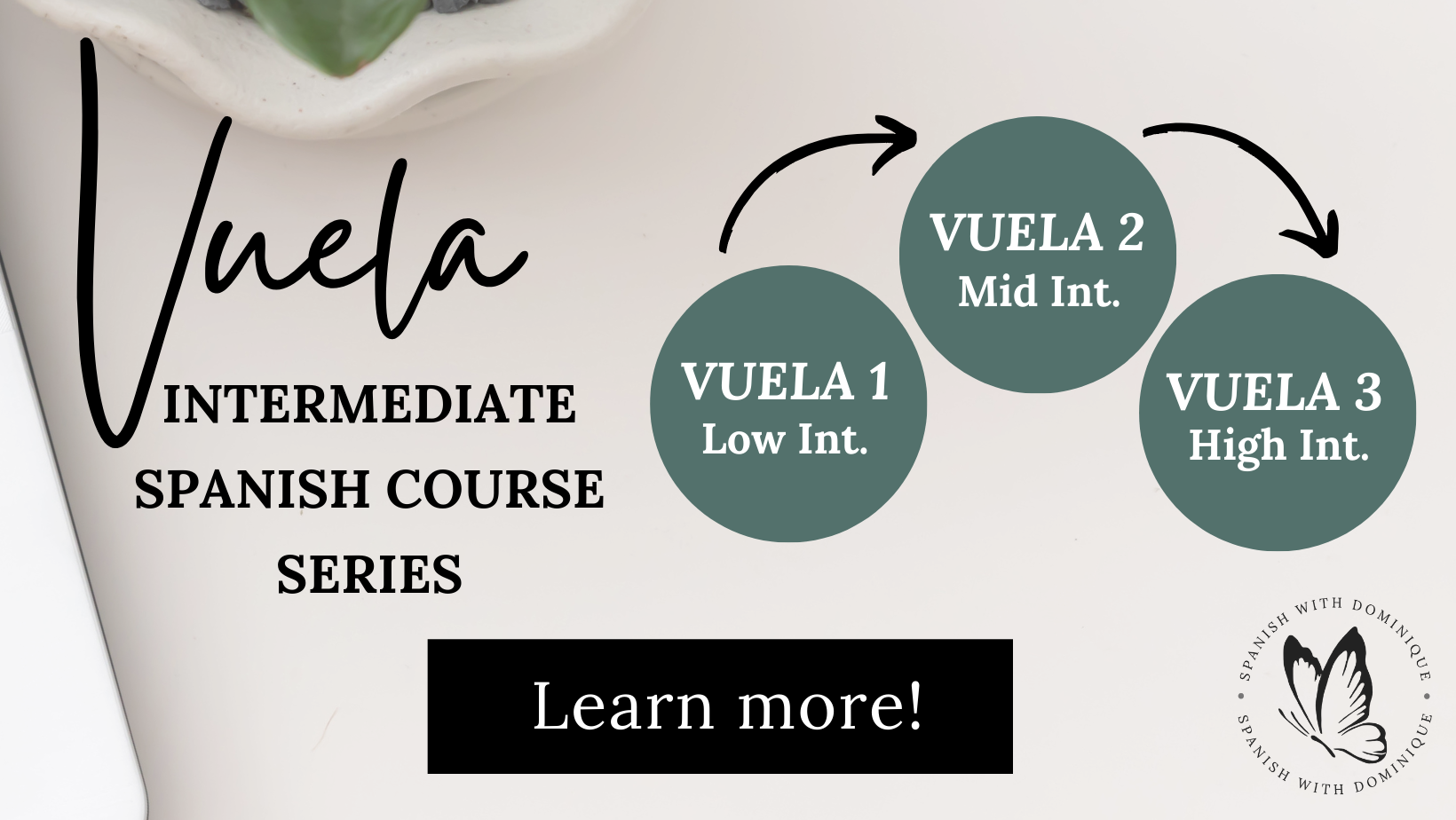Why You DON’T Have to Live in a Spanish-Speaking Country to Learn Spanish
In this post: Why you don’t have to move to or live in a Spanish-speaking country to learn Spanish and 4 strategies on how to get started at home.
Can I tell you a story? It’s about a mom of three, in her early 40s with a full-time job she loved, living in a quaint suburban neighborhood outside of a large US city, who really wanted to learn Spanish.
Except, she wasn’t sure if she could because she was in a season in her life where traveling internationally for long periods of time was not an option.
Do you know what she was thinking? It went something like this, “I have a full-time job and a family. I don’t have the time or the freedom to just get up and move to Bogotá, Colombia, or Oaxaca, Mexico, or some other incredible place to immerse myself in Spanish. But, I’m still so motivated to learn.”
If you just felt your heart sink a little in disappointment, maybe you’ve worried about the same thing. That dropping all your responsibilities to go live in a Spanish-speaking country is the only surefire way to become fluent in Spanish.
But here’s the thing:
Sometimes we tell ourselves stories that stop us from learning Spanish as adults before we even start. And one of the biggest is thinking you have ‘missed the boat’ because you haven’t lived or can’t live in a Spanish-speaking country.
The truth is, traveling to and even living in a Spanish-speaking country is not a magic pill that ensures you will come out speaking Spanish — al contrario! Sometimes people stay for years in a country and still fail to learn the local language.
In this post, we’re going to dig into the ways to set you up for fluency success before and during your travels, as well as debunk the myth that you have to live or spend extensive time in a Spanish-speaking country to speak Spanish fluently.
So grab your café con leche and let’s jump in!
While reading this post, think about these questions:
Can you think of a time when you (or a friend) traveled to another country, but never spoke the language while there?
How could you immerse yourself in Spanish where you are?
What Spanish-speaking country would you love to visit — just for the joy of it — not because it will magically make you fluent?
Why learning Spanish solely by immersing yourself in a Spanish-speaking country is way harder than you think
I know from experience that just showing up in a Spanish-speaking country as an adult does NOT guarantee you will learn the language. It did, however, give me lots of embarrassing stories to tell about how actually speaking Spanish was way harder than I thought.
After a few months of living in Barcelona, I was quickly thrown into some really uncomfortable and awkward situations [which I later learned was a huge part of learning a new language as an adult].
Like that one time at a Barcelona salsa club on a hot summer night in 2011, when I yelled above the music [amongst a group of men no less] "¡Estoy muy caliente!” as I smiled and fanned myself. Minutes later I was mortified to find out the sexual connotation of what I had just screamed out loud for the world to hear [it’s still cringe-worthy when I think about it, so I won’t go into detail, but you can go look up the expression 😉].
There’s another thing about going off to learn Spanish in another country without any prior knowledge of the language that most people don’t realize: sometimes, going abroad to learn Spanish can actually backfire on you.
How? I’ve seen people get so nervous about not being able to communicate that they stick with other Americans when living in a Spanish-speaking country. Even when they traveled all that way to go through weeks of language immersion classes!
In fact, I know someone who lived in a Spanish-speaking country for almost a year and came home having learned zero Spanish. Because she was afraid.
Afraid to leave her comfortable community of English-speaking friends.
Afraid she would get lost and not be able to ask for or understand directions.
The few experiences she had where she attempted to speak Spanish at the beginning of her stay left her feeling too afraid to try again. So she stuck with English speakers for the rest of the time.
Think about it: how many stories have you heard about entire ex-pat communities that never really learn to use the local language? It can go on for generations in some cases!
Before investing the money into studying Spanish abroad, ask yourself a serious question:
Will you be willing to step out of your comfort zone when you get to the country and surround yourself with Spanish speakers? [Or are you going to stick with English speakers because it’s easier?]
Are you going to put in some time before your trip to build the skills you need to partake in a simple Spanish conversation? [Or are you just going to wait until you get there so that Spanish sounds like a panic-inducing noise rather than something you’re familiar with?]
You absolutely deserve to be able to travel to a Spanish-speaking country and enjoy yourself if that’s your dream. And for many of us, it is!
But learning some Spanish first — at least enough of the basics — before your trip is much more doable, comfortable, and safe. And will set you up for success during your immersion trip.
As an adult, just ‘picking up Spanish through immersion’ is not the most efficient way to learn.
Do you know what I realized when I actually upended my life and traveled to Spain?
I wasn’t going to learn everything I needed to become fluent by just ‘talking to people’ or through natural exposure. In fact, it took me about 6 months to even start stringing together coherent sentences in spontaneous situations.
Back in 2011, all I had to carry me were my high school Spanish classes. I wish I had prepared myself more before my trip because I could have avoided some uncomfortable situations as well as reached conversational fluency a lot faster.
As an adult, I quickly realized that I was going to need structured classes and practice to work up to the confidence to use Spanish in everyday life.
And you know what? Nothing came naturally. I had to do the work.
I actually showed up for and participated in my daily Spanish classes, worked through about 5 or 6 grammar books, created flashcards [and reviewed them daily], and studied…A LOT. [I know, I know, nerd alert.]
During that time, I decided NOT to hit the beach with the other English speakers. NOT to go out and party. And NOT to meet up with local ex-pat groups or other Americans also living in Barcelona.
You’re probably starting to get the picture: do smart, effective language study designed for adults before and during your immersion trip to see the fastest results.
And if you do get the incredible opportunity to do a language stay in Mexico City — or your dream destination — make the most of that time by using these strategies:
And if you do get the incredible opportunity to do a language stay in Mexico City — or your dream destination — make the most of that time by using these strategies:
Be intentional and focused and leave with a plan. Ask yourself, “How am I going to prioritize learning Spanish on this trip?” “Where is the local Spanish school, and how can I get signed up for classes?”
Make sure you have enough opportunities for immersion to make your trip worth it. I recommend 3-4 hours of immersion every day.
Bring your own effective learning materials— and use them. You can make progress a lot faster in Spanish if you take the time to actually study instead of only relying on ‘picking Spanish up’ by chance.
Ask yourself, “How am I going to cut out distractions while I’m there so I can focus on Spanish?” Hint: consider putting in the work you need to really see progress and then rewarding yourself with a day of sightseeing or a trip to a museum or beach.
How you can immerse yourself in Spanish — at home.
If there’s one thing I want you to remember today, it’s this: You can immerse yourself wherever you are.
You have some really powerful ways of creating your own Spanish immersion at home — at your own pace and in a way that works for you.
Here are just a few:
Find a podcast you love or make yourself a great playlist.
Head to a local market, cafe, or another spot where Spanish speakers hang out and see if you can hear a word or two that you recognize. Jot it down in your notebook.
Organize a language exchange with someone in your community and share time speaking English and Spanish so you both win and you make a connection.
Volunteer with organizations that work specifically with Spanish-speaking populations [i.e think local schools, hospitals and clinics, food banks, churches, ESL programs, Big Brothers Big Sisters, the YMCA, etc.]
Your takeaways for learning Spanish as an adult (without living abroad).
Traveling to a Spanish-speaking country is loads of fun and can fill your life with so much joy — I highly recommend it. But you definitely don’t have to live in a Spanish-speaking country to become fluent.
And you shouldn’t expect to just ‘pick Spanish up’ simply because you take a plane to a Spanish-speaking country without a plan.
If traveling to a Spanish-speaking country is your dream, then I hope you’ll get to take that trip someday soon. Just keep in mind that:
You’ll have a better, more authentic experience if you immerse yourself in Spanish before your trip.
You can create plenty of high-quality Spanish immersion situations where you are, without ever living in a Spanish-speaking country.
You won’t become fluent in Spanish simply through exposure. You need to really think about and plan your immersion experience to get the results you want.
More Posts Handpicked Just For You!
Enjoyed this post? Here are some more you might like.






